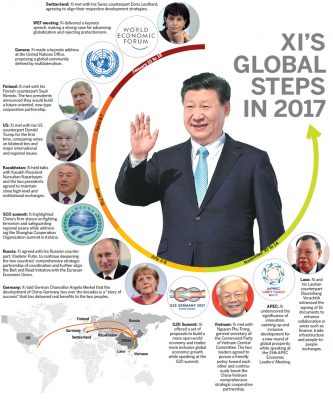
China has taken a more proactive and positive approach in its diplomacy this year, with a number of China-raised proposals translated into real outcomes and actions by the global community, analysts said.
The influential proposals raised by China in recent years include the Belt and Road Initiative, building a community of shared future for mankind, and fostering a new form of international relations. All of them yielded fruitful results in 2017 with China’s promotion.
The Communist Party of China’s 19th National Congress held in October has established Xi Jinping Thought on Socialism with Chinese Characteristics for a New Era, and it has set out the direction for China’s diplomacy in the new era, Foreign Minister Wang Yi told a diplomatic symposium early this month.
“This has given Chinese answers to the serious questions confronting the world. That is to say, China believes it is essential to advance peace, development and winwin cooperation, foster a new form of international relations and build a community with a shared future for mankind,” he said.
Building the Belt and Road
The Belt and Road Initiative, put forward by Xi in 2013 to boost interconnectivity between Asia and the rest of the world, has delivered real benefits through win-win cooperation and attracted extensive participation.
In May, Xi successfully chaired the first Belt and Road Forum for International Cooperation in Beijing.
The heads of state from 29 foreign countries, senior representatives from over 130 countries and heads of 70-plus international organizations attended the event.
At the forum, Xi set out the objective of building the Belt and Road into a road for peace, prosperity, opening-up, innovation and exchanges among civilizations.
A series of major projects were launched on the ground during the forum. A win-win cooperation network is being set up, centering around the Eurasian continent and reaching out to continents and oceans across the world.
China has signed Belt and Road cooperation agreements with 80 countries and organizations and built 75 overseas economic and trade cooperation zones in 24 countries under the Belt and Road framework, according to data released by the Foreign Ministry.
Chinese businesses have invested over $50 billion and created nearly 200,000 local jobs in the countries involved in the Belt and Road Initiative.
“The Belt and Road has responded to the shared desire for accelerated development and seeks to pool the resources from wider areas,” said Jin Yong, deputy head of the School of International Studies at Communication University of China.
The initiative will inject strong impetus to the building of a community with a shared future for mankind, he said.
Boosting open economies
Facing sluggish global economic growth, China has provided the solution, that is, to advocate free trade and economic globalization.
In his keynote speech at the World Economic Forum in Davos in January, Xi emphasized that many of the world’s problems are not caused by economic globalization, and trying to reverse the trend of globalization will be futile.
“Practicing trade protectionism is like locking oneself in a dark room. It seems to have screened wind and rain, but it also isolates one from sunshine and air,” Xi said at the forum.
The president advocated free trade and open economies on various occasions and global stages including the G20 Hamburg Summit, the BRICS Xiamen Summit and the APEC Economic Leaders’ Week held in Da Nang, Vietnam.
“Openness brings progress, while self-seclusion leaves one behind. China will not close its door to the world, we will only become more and more open,” Xi said in the report of the Party’s 19th National Congress.
Foreign direct investment made by global companies on the Chinese mainland rose by 9.8 percent year-on-year to 803.62 billion yuan ($122 billion) in the first 11 months, according to the Ministry of Commerce.
China’s open stance was reiterated at the Central Economic Work Conference held from Dec 18-20 at which economic work was mapped out for the next year.
The country will increase imports and cut import tariffs on some products, expand free trade zone pilots, guide and support outbound investment, and push for a shorter negative list for foreign investment, according to a statement released after the meeting.
Building a community of a shared future
On Dec 1, Xi called on political parties worldwide to make joint efforts to build a community of a shared future for mankind as the CPC held the first high-level dialogue with world political parties in Beijing.
Xi’s speech, lasting about half an hour, drew applause nearly 20 times from the around 600 delegates. The concept of building a community of a shared future for mankind has been translated into real actions, Xi said.
Even since he first expounded the overarching idea to the world in 2013 in a speech at the Moscow State Institute of International Relations, Xi’s proposition has charted a clear and viable course forward.
“Our world is full of hope and challenges. … No country can address alone the many challenges facing mankind; no country can afford to retreat into self-isolation,” Xi said in his report to the CPC’s 19th National Congress.
In Xi’s view, a community with a shared future for mankind should feature mutual respect, diversity and dialogue based on equality and peaceful co-existence among different civilizations, and the world order should be decided not by one country or a few, but by broad international consensus.
In February, the 55th UN Commission for Social Development approved a resolution that called for more support for economic and social development in Africa by embracing the spirit of building “a human community with shared destiny”.
It was the first time that a UN resolution incorporated the important Chinese concept.
William Jones, Washington Bureau chief of US publication Executive Intelligence Review, told Xinhua News Agency that Xi’s proposal is an “attempt by the Chinese president to overcome and replace the traditional notion of ‘geopolitics’, in which there are always ‘winners’ and ‘losers’, and in which the principle of ‘might makes right’ tends to predominate”.
“In this new concept, everyone plays a role and the benefits achieved by any one nation can be shared by all,” he was quoted as saying.
Xi has also played a constructive role in improving global governance. Beijing has been pushing for a bigger say for the developing world in key global bodies and dedicated to building a new type of international relations.
To maintain world peace, China has been a top contributor to UN peacekeeping missions and steadfastly championing peaceful settlement of hot-button issues worldwide.
Ruan Zongze, vice-president of the China Institute of International Studies, said that now as the world is facing more and more uncertainties and challenges, expectations are running high for China to make more contributions to world development.
“As the largest developing country, China’s positive voices and actions are like sunshine for the global community because China’s international policy could be a great assurance for the world to face uncertainties,” he said.
Xinhua contributed to this story.


